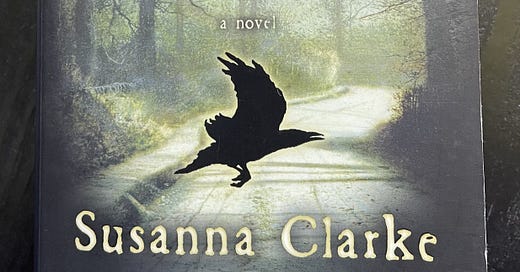Jonathan Strange and Mr Norrell by Susanna Clarke
I hadn't heard much about this novel before I read it, but I kept seeing it in charity shops and the library and eventually I read the back because it had an intriguing title, and it sounded like the kind of thing I might enjoy. A historical fantasy novel in which Yorkshire is a key place, and one of the two characters named in the title is a Yorkshireman. Excellent.
English Magic is in a bad way. There are no practical magicians any more, and the Golden Age is long over. Mr Norrell strongly feels it's time for a revival, but only if it's done properly. Which is to say, by him. As a curmudgeonly old Yorkshire recluse, he doesn't seem like the ideal candidate for a trip to London to interest the government in English Magic. Magicians are not quite respectable, so society feels. However, he must try, and when he gets himself a pupil in the form of handsome young Jonathan Strange, the fate of English Magic looks much rosier than it has in a long time. Nothing is ever that simple, of course, and by drawing attention to themselves Strange and Norrell evoke the envy and enmity of some powerful people.
I almost feel bad for saying anything negative about this book; the plot is entertaining and at times tense, the characters are well-drawn and the era is vividly evoked, not least by the writing style. The length, however... Well, the length in itself isn't a problem (about a thousand pages in the paperback edition I bought), I have books that are as long or longer by Tad Williams and Stephen King. It could be the apparent lack of activity for long periods, but then I enjoyed Proust's Remembrance of Things Past which is a longer book in which less dramatic things happen at less frequent intervals. I think in my view the very thing that makes the novel so unique has brought about its downfall.
The book is set in the early years of the 19th century, in fact the Napoleonic Wars feature prominently during one part of the book. The author has therefore taken the (at first glance brilliant) decision to write in the style of a Georgian or early Victorian popular novel; the spellings sometimes look odd (chuse, shew rather than choose or show) and the long-winded style with asides into gentle social satire or an examination of manners reminded me a little of Anthony Trollope (which, as regular readers will know, I intend as high praise). However, when it comes down to it this is a fantasy novel, a novel in which the stakes are lives and kingdoms and ways of life, not who will marry whom and when. While it was amusing to read of magic in England in such a commonplace manner, and much as I enjoyed the reply to a question on whether a magician could kill someone by magic ('I suppose a magician might, but a gentleman never could'), ultimately I found it was too laid-back a style for what was happening.
A magician achieves something not achieved for hundreds of years, he's alone and it's dangerous, but because of the style this feat is described almost as though he's dressing for dinner, and there is never any insight into whether he was afraid or what the consequences might have been. His wife does make him promise not to try it again for a while, but there's no sense of her being terrified of what might happen. The asides and the scene-setting (amusing dialogues at society parties or in Cabinet meetings, for instance) do help place the story in time, but tension that has built up dissipates during these sections and I'd almost forgotten what jeopardy a character was in the last time we saw him, by the time he turns up again some chapters later in different circumstances.
My other half started reading Jonathan Strange and Mr Norrell but gave up after about 300 pages. He said he kept thinking something was about to happen, then it didn't, and in the end he grew tired of the anticlimax. I persevered to the end of the novel because I wanted to know what happened to the characters (who I had been made to care about), and I was impressed by what had been attempted with the book (the setting and the style), but I confess I wasn't racing through chapters in a dash to the end, in fact it took me longer to read than any novel has for many years. In short, I want to recommend this book for so many reasons, but I'm reluctant because 9 out of 10 of you will resent me for wasting weeks of your time.




